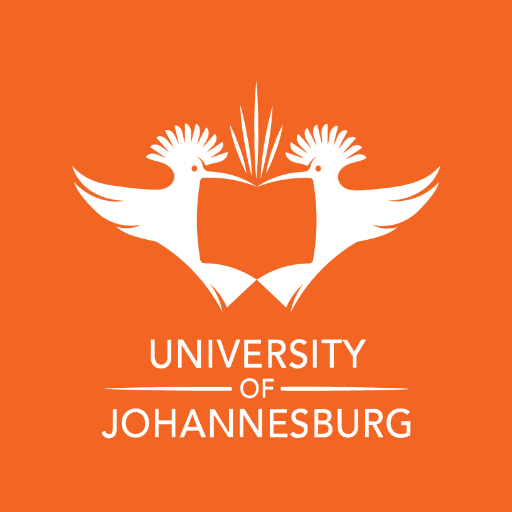Research
RESEARCH PROJECTS IN THE DEPARTMENT OF CHILDHOOD EDUCATION
Some research projects in the Department of Childhood Education (DCE) involve multiple researchers. Many of the projects have a teacher education/teaching and learning focus. The projects include:
- Creative Coding @UJ Faculty of Education project
- The fNIRS project
- Lesson Design in Pre-Service Teacher Education project
- Mixed Reality Simulation in Pre-Service Teacher Education project
- An online BEd in foundation phase teaching in partnership with selected schools project
You can read more about each project below.
Creative Coding @UJ Faculty of Education
The “Creative Coding@UJ Faculty of Education” project combines development and research. The interest of the Faculty in teaching creative coding using the graphical programming language Scratch (https://scratch.mit.edu/), stems from wanting to prepare teachers for a rapidly changing world mainly due to the exponential advancement in technology, including artificial intelligence – the fourth industrial revolution (4IR). The project has five components. The first component is the Scratch Coding Club (SCC), offered to fourth-year BEd and PGCE pre-service teachers outside the formal teacher education curriculum. Three other components of the project involve in-service teachers. Creative Coding for Teachers (CCT) is offered for free to interested teachers. Those teachers who wish to learn more could register for a short learning programme (SLP) on coding and robotics for teaching. Some in-service teachers who completed the SLP wish to start coding clubs at their schools – UJ-associated Creative Coding Clubs. A community of practice has been established to support these teachers. The research, which is the fifth component of the project, aims at studying the components of the project mentioned above. The research currently involves one PhD, one master’s and four honours students. Four staff members are involved – Prof Sarah Gravett (project leader), Linford Molaodi (project manager), Kenneth Baloyi and Taryn Bennett. The work done by the project facilitators, current and former students who showed potential to do this work while they were involved in the SCC, is indispensable for the project’s success. The project is supported by the Lifelong Kindergarten group at the MIT Media Lab.
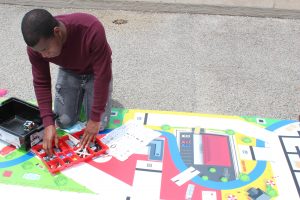
Linford Molaodi at the Scracth Coding Club
The fNIRS project
This research project forms part of a greater project in the NRF South Africa Chair: Integrated Studies of Learning Language, Science and Mathematics in the primary school. The focus of the project is to gain a better understanding of how primary school children learn mathematics by using functional near-infrared spectroscopy (fNIRS). fNIRS is a noninvasive, easy-to-use imaging technology that enables studies of normal brain function in both in laboratories and real-world settings like classrooms. Brain functioning of children can thus, be measured while they work on mathematical problems in the classroom, as shown in the figure below.
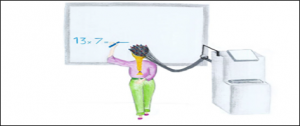
While a child solves a mathematical problem her brain activation is recorded. Source: Soltanlou & Artemenko, (2020, pg. 4)
fNIRS is safe to use on babies, children and adults as it uses near-infrared light to measure concentration changes in oxygenated and deoxygenated haemoglobin in cortical brain structures. Near-infrared light is used as it can go through skin, bone, and the brain. When using fNIRS, we are interested in the brain’s functions and not the structures. For more information, contact Dr Kathleen Fonseca, who is involved in the project.
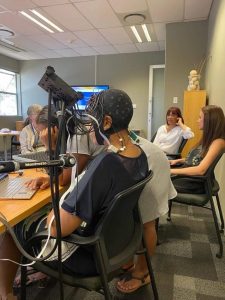
fNIRS in action
Lesson Design in Pre-Service Teacher Education project
This longitudinal research (2020-2024) involves initial teacher education (ITE) students (1st to 4th year) at the UJ Soweto Campus, as well as teachers in the Funda UJabule School (the teaching school associated with the Faculty of Education) at the UJ Soweto Campus. The research aims to explore the implementation of a lesson design approach that draws on the science of learning literature and that purposefully infuses competencies for a fast-changing world. The lesson design approach was piloted in 2020 with 4th-year students. The findings of the pilot were used to refine the approach. It was refined at the end of 2020 through two workshops with a task team of teacher educators involved in the Soweto Campus ITE programmes. The research will track the cohort of student teachers who enter the programme in 2021. The research with fourth-year student teachers that commenced in 2020 will also continue. It involves exploring the design and enactment of lessons by student teachers in the fourth year of the programme. Through designing and implementing the lesson design approach for the BEd (Soweto Campus) and at the FUJS, we aim to advance knowledge about the nature and characteristics of the intervention and what is involved in designing and refining it. This type of output brings forward the practice relevance of the research. The envisaged theoretical output of the research will include the comprehensive articulation of design principles. Prof Sarah Gravett is the project leader. Staff members involved are Prof Sarita Ramsaroop, Dr Dean van der Merwe, Taryn Bennett and Lerato Ndabezitha.
Mixed Reality Simulation in Pre-Service Teacher Education
The “Mixed reality simulation (MRS) in pre-service teacher education project” is a research project that explores how MRS can be used to guide and support pre-service teachers to develop competence in using core teaching practices. The technology used for the teaching simulations utilises a combination of immersive virtual environments and human-directed in-the-moment puppetry, a model known as human-in-the-loop (HITL). The MRS platform that is used in the research is TeachLivE™. TeachLivE™ utilises HITL avatar-based simulated environments, meaning that the participating student teachers interact with computer-based, human-controlled avatars acting as learners. The initial focus of the research is on the use of questions as a core teaching practice. Some of the research objectives are to investigate how student teachers experience MRS and how the affordances of MRS advance student teachers’ effective utilisation of questions. Prof Sarah Gravett is the project leader, and Dr Dean van der Merwe is the co-leader. Staff members involved are Prof Sarita Ramsaroop, Prof Jacqueline Batchelor, Prof Nadine Petersen, Dr Kathleen Fonseca and Pumzile Mello who is doing her PhD research within the project. In addition, two master’s students are involved namely Pamela Tshabalala and Casey Bremner. Thandeka Ncube, will also be joining the project as a PhD-student. Prof Carisma Nel of North West University is a research collaborator. Though the project was launched recently only, there is already evidence that the student teachers are benefiting from their involvement in the MRS. They show increased competence in relation to using questions as a core teaching practice. Their reflections on their experience show deep thinking about their practice and increased self-efficacy.
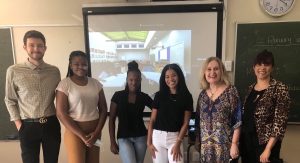
DCE staff members and research students involved in the MRS research project (not all were present)
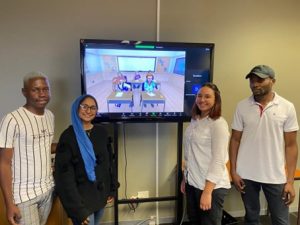
Fourth-year intermediate phase student teachers involved in the MRS project
An online BEd in foundation phase teaching in partnership with selected schools
The project, funded by the Zenex Foundation, involves piloting the online Bachelor of Education (BEd) in Foundation Phase (FP) programme from 2021 to 2024. The programme is offered online in partnership with selected schools that offer full-time internship positions (referred to as school-based student teachers [SBST]). Our rationale for wanting to offer this is to extend the University of Johannesburg Faculty of Education FP teacher education model, which incorporates a teaching school (TS), to provide wider access and to contribute to in-service teacher development in selected public schools. Iterative cycles of formative evaluation research (evaluation aimed at improvement) will be conducted over four years (starting in 2021) to contribute to the theory and practice of teacher education. We will also be advancing knowledge about the nature and characteristics of the intervention and what is involved in designing and developing such a programme. One of the outputs is an annual webinar/seminar, the first of which was held in 2021, titled: Stakeholder experiences of UJ’s first fully online BEd (Foundation Phase) programme Implemented in partnership with the REALEMA Teacher Intern Programme and St Peter’s College. The core research team includes Prof Sarita Ramsaroop (project leader), Prof Nadine Petersen (project co-leader), Prof Sarah Gravett, Prof Jacqueline Batchelor, and Kenneth Baloyi.
STAFF BUSY WITH POSTGRADUATE STUDIES AND OTHER RESEARCH PROJECTS
Some staff in the DCE are also busy with masters, PhDs and other studies. For more information regarding the focus of their studies, refer to the table below:
| Charis Allison | Charis Allison’s research area includes preparing intermediate phase student teachers for the English language classroom. To this end, she is building on her MEd study completed in October, 2020, wherein she conducted research into practising teachers’ academic language proficiency skills. Her current research study investigates the readiness of student teachers to take on the task of developing their learners’ academic language skills. Her PhD study aims to continue to research improved language skill development for students, leading to the eventual transfer of the much-needed language skills for learners in the upper grades of primary school. |
| Ntiski Khasu | Ntsiki Khasu is enrolled in a PhD in Childhood Education. Her research is titled How student teachers create classroom plays about artificial intelligence – in Sesotho and IsiZulu. Her motivation for pursuing this study is to contribute to the introduction of artificial intelligence vocabulary in Sesotho and IsiZulu for primary school. Such research can contribute to the preparation of student teachers for teaching in a rapidly changing world where the regular reference to 21st-century skills is necessary in teacher education. Thus, her research explores the modality of dramatic playwriting as an avenue through which student teachers learn about basic artificial intelligence and do so in two of South Africa’s languages, IsiZulu and Sesotho. |
| Karen McCarthy | Karen McCarthy has just completed her PhD study on the representation of women in a selection of the Irish author John Banville’s recent novels. The thesis explores the instrumentalisation of female characters, which often amount to vacant placeholders and tools in the writer’s favoured thought experiment of staging a melancholy, narcissistic and isolated man attempting to remember women he has lost. The theoretical approach is narratological, focusing on form and its implications for the representation of female characters. Karen is currently working on a paper that looks at second-person narration in a selection of recent Irish women’s writing. The reader is positioned by such narration as the interceptor of intimate communication between two people. Such exchange often conveys that which pertains to intimate and domestic spaces, and often what is perceived to concern only women. Second-person narration is intimate and a fitting conduit for domestic concerns; it is also ironically monologic and therefore disruptive. The paper will contend that the mode is particularly well suited to convey uninterrupted women’s voices. |
| Linford Molaodi | Linford Molaodi’s PhD research is guided by the following research question: What do student teachers learn from their participation in a “Scratch Coding Club” that could enhance their preparation for teaching? The study stems from the Scratch Coding Club (SCC) offered to fourth-year BEd and PGCE pre-service teachers at the Faculty of Education, outside the formal teacher education curriculum. The study adopted an interpretive qualitative research design. Data were collected from student teachers who submitted portfolios of program completion. Semi-structured interviews, artefacts, and reflections were transcribed and analysed inductively using ATLAS.ti. The emerging key insights suggest that teaching pre-service teachers to code, using Scratch, in a supportive and joyful learning context could enhance their development as teachers, professionally and personally. |
| Pumzile Mello | The aim of the recently concluded M.Ed. study of Pumzile Mello was to explore final year student-teachers’ conceptualisation of an ideal teacher for a fast-changing world as captured in their research projects. This was a basic qualitative study, and its data was collected by analysing student-teachers’ research projects and conducting semi-structured interviews with them. The study’s main findings revealed that student-teachers have varied conceptualisations of an ideal teacher for a fast-changing world. However, their views converge as follows: Ideal teachers for a fast-changing world must: be adaptable to face abrupt changes in the fast-changing world effectively; acquire essential digital skills; encourage agency in the teaching and learning environment; use innovative teaching methods in the teaching and learning environment; and value continuous professional development. Pumzile’s research journey continues. She is embarking on a PhD study which focuses on exploring the affordances of MRS Mixed Reality Simulation to advance student teachers’ effective usage/utilisation of questions as a core teaching practice. |
| Lerato Ndabezitha | The focus of the PhD study of Lerato Ndabezitha is on a guided play course that was designed and implemented in 20221. This design-based research study addresses the following research question: What design principles could constitute a valid, feasible, and effective design for a course on guided play for first-year preservice teachers? The study consisted of three phases: the analysis and exploration phase, the implementation phase, and the final reflection phase. The analysis and exploration phase included a literature review that informed the rationale for the course, the articulation of initial design principles, and the development of the course. The course was implemented for six months (the first semester of the academic year). During this phase, data were collected and analysed. The final reflection phase is still in progress. It includes the retrospective consideration of findings and observations to yield a better understanding of the intervention (the course), the appropriateness of its intentions, how it was implemented, and the results it produced. Lerato and her supervisor is currently writing an article on the research, and she plans to submit her study by the end of 2022. |
| Fikile Simelane | Fikile Simelane recently completed her PhD study. Her research focus is on ‘Initial Reading Instruction’. The topic of her study was ‘Learning to read in isiZulu’. The motivation for doing the study was her concern about the state of reading competence in schools and, with that, the revision of the teacher education program in which she is a lecturer. In addition to the motivation to contribute to practice, she wants to contribute to filling the gap in the pedagogy for initial reading in isiZulu and other Nguni languages. |
| Hayley van der Haar-Lockie | Haley van der Haar-Lockie’s past research has focused on mentoring practices at the Funda UJabule School, focusing on mentor teachers’ perceptions of their mentoring role. As a PhD candidate, she is exploring her interest and research in literacy teaching in primary school, focusing on the teaching of initial reading in early primary grades. |
| Maria Vaz | Maria Vaz is a PhD student, and the research project that she is currently involved in as a coordinator is the Sesotho and IsiZulu Reading Project (SIRP). The project is an offshoot of the Primary Teacher Education Project (PrimTed) which seeks to enhance the teaching of reading and mathematics to prospective teachers in South African universities. The aim of the SIRP thus is to improve reading instruction in Sesotho and IsiZulu for BEd students in twelve universities that offer these languages in their BEd programmes. To achieve this aim, the SIRP conducted preliminary research to establish the teaching of reading instruction to BEd students in the participating Higher Education Institutions (HEIs), and the results showed that there is a need to enhance the teaching of reading instruction in the various HEIs. |
